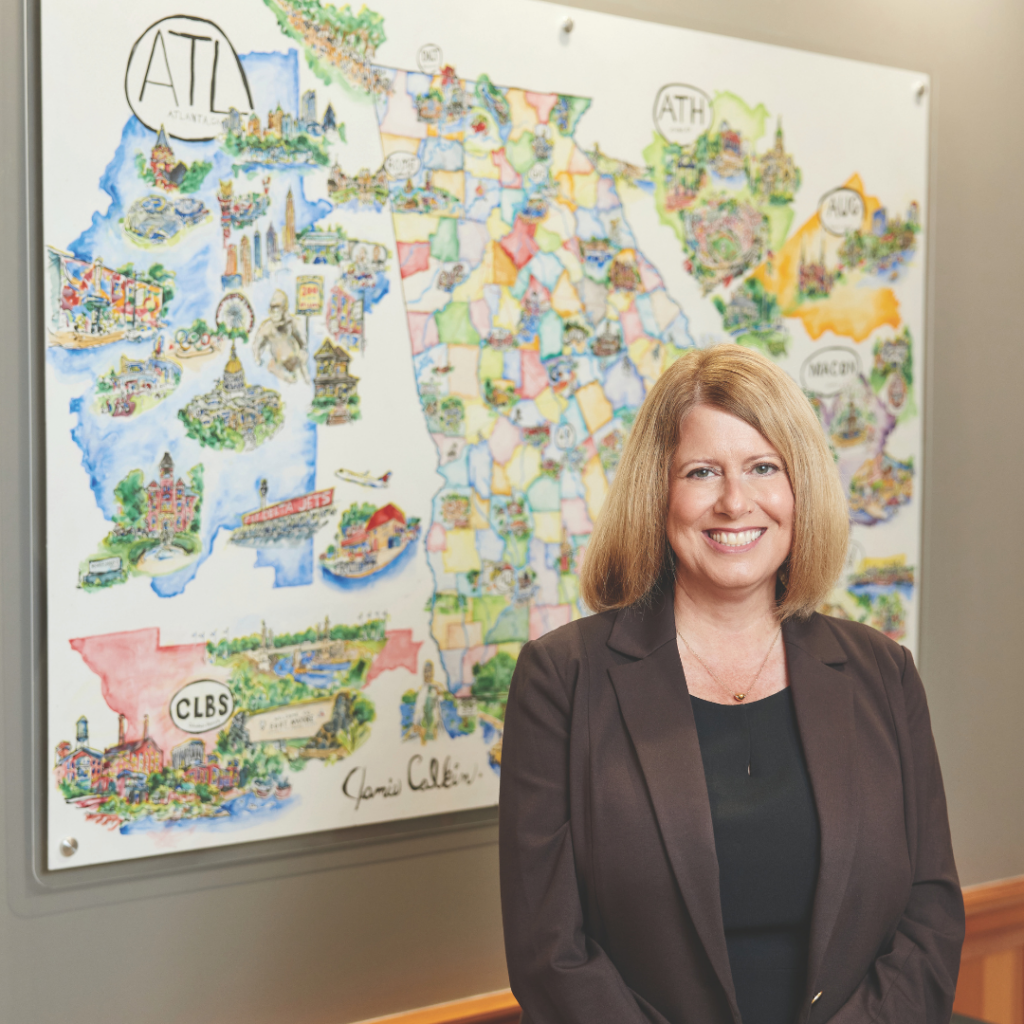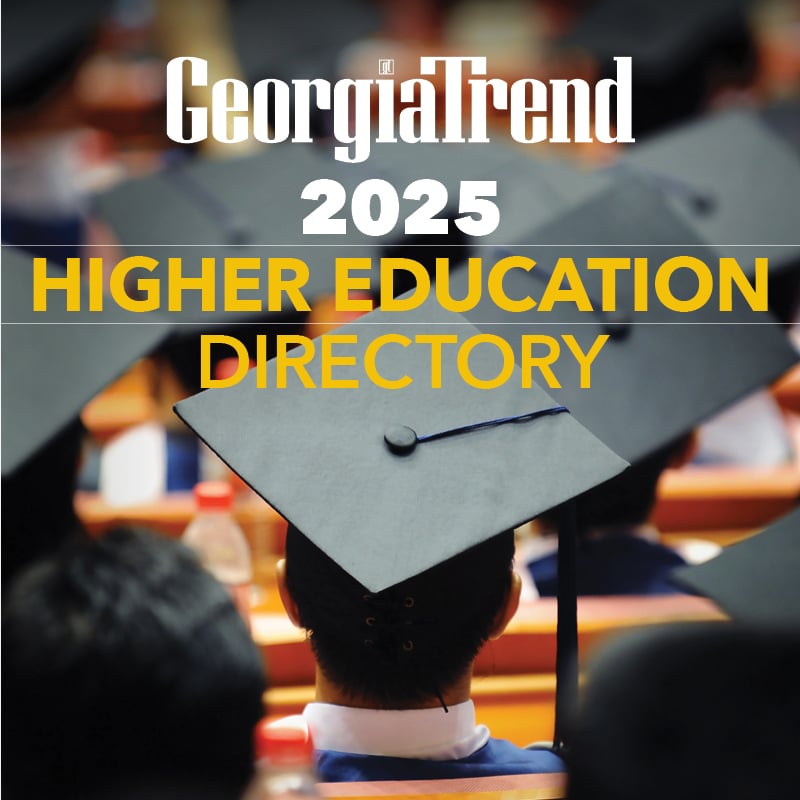A Recognized Resource
With enrollment rising, Georgia’s technical college system offers innovative programs to fill the workforce pipeline.
In December 2023, Catherine Higgins fulfilled her longtime goal of earning a college degree. At 75 years old, the former judicial assistant graduated from West Georgia Technical College (WGTC) in Carrollton with an associate degree in General Studies with a concentration in criminal justice. Higgins was also an honor graduate and selected to speak at her graduation ceremony.

Increased Funding: Technical College System of Georgia Commissioner Greg Dozier says higher enrollment led to millions of dollars that can be used to help students. | Photo credit: Daemon Baizan
“I had a three-sentence speech,” she said. “‘Be kind, be happy, be adventurous and be grateful.’ I ended my speech by saying I had a dream, and we all have dreams, and everyone’s dream is possible.”
Higgins’ dream came true because she had the desire and because Georgia offered classes at technical colleges for free for students over age 62.
“I was retired and on a fixed income,” Higgins says. “I just had to pay for books and the student fee, but I didn’t pay any tuition for my entire program.”
Nontraditional students like Higgins and many others are flocking to technical colleges. After several years of enrollment decline, mostly due to the COVID-19 pandemic, the Technical College System of Georgia (TCSG) reported enrollment was up 10.6% in fall 2023 from the same point the previous year. Close to 105,000 students enrolled in one of Georgia’s 22 technical colleges in 2023. The increased enrollment is part of a national trend being tracked by the National Student Clearinghouse Research Center: Nationally, more students are enrolling in programs where they can earn short-term certificates and credentials.

Pursuing her Dream: Catherine Higgins graduated from West Georgia Technical College in Carrollton at age 75. | Photo credit: contributed
The surge bodes well on a number of fronts, including for increases in funding for TCSG.
“We had a 3.8% increase in enrollment last year and, according to our [funding] formula, that enrollment increase produced an increase of a little over $9 million in funds for servicing our students,” says TCSG Commissioner Greg Dozier. “Looking ahead to next year, if we maintain our current trajectory, there ought to be a significant increase in funding to meet the requirements of our students and the services necessary for them.”
He cited Gov. Brian Kemp’s support of TCSG projects that made their way into the governor’s budget in January and were then recommended to the General Assembly, including:
- $19.5 million in renovations supporting a workforce accelerator for e-mobility and advanced manufacturing on three campuses: Chattahoochee Tech (North Atlanta), Central Georgia Tech (Milledgeville) and West Georgia Tech (LaGrange).
- $3.5 million for the final outfitting – fixtures, equipment, furnishings – of the Georgia Industrial Systems and Industrial Robotics Training Center (GISIRTC), part of Ogeechee Tech, built in partnership with Bulloch County and the Development Authority of Bulloch County.
- $9.8 million to renovate the Walton County Campus of Athens Technical College, a former high school in Monroe. Phase 1 renovations include a 7,000-square-foot welding lab and enhancing the industrial and machine tech facilities.
- $16.9 million for construction and industrial technology renovation at Georgia Northwestern Technical College in Floyd County.
- $8.9 million to build a new transportation and logistics facility at Wiregrass Georgia Technical College in Lowndes County.

Holding a Spot: The Georgia Student Finance Commission (GSFC) team displays an oversized version of the letter mailed to eligible high school seniors, telling them a TCSG or USG school is holding a space for them. | Photo: contributed
Matching the Need
Much of the proposed funding aligns with the high-profile industries investing heavily in the state, many of which require a workforce trained in advanced manufacturing, industrial technology, and transportation and logistics. Dozier says the budgeted renovations match up well with high-demand “credentials of value,” non-degree credentials that have significant value in the labor market.
And right now, there’s even more interest than ever in those types of credentials, thanks in part to Georgia Match, an innovative direct admissions program begun last year. Georgia Match sends a letter to every graduating senior in the state, public and private, who has earned at least a 2.0 high school grade point average in the core courses of English, math, science, social studies and foreign language. The GPA of those core courses is called the HOPE
GPA. Schools also consider the student’s freshman index score, which is a calculation of the HOPE GPA and the SAT/ACT score. The letter lets them know they are academically eligible to attend one of Georgia’s 22 technical colleges and potentially a University System of Georgia (USG) college, then advises them of the next steps to take.
“In 2021, 26.5% of high school graduates in Georgia went straight into the workforce,” says Lynne Riley, president of the Georgia Student Finance Commission (GSFC), which administers Georgia Match and all of Georgia’s state- and lottery-funded scholarship programs, grants and other student aid. “This [population] is the target for a program like Georgia Match, students who may not have realized they were qualified to go to many USG schools, including technical colleges.”
The Georgia Match initiative is possible because the GSFC has high school student data from public and private high schools, enabling them to calculate the GPA eligibility for USG colleges. There is no minimum GPA for technical colleges. Last spring, the GSFC began training high school counselors, providing them with the basics of the program, so they would be prepared to assist students. Last November, 132,000 letters were sent to high school seniors informing them of their eligibility.

Transforming Education: The Georgia Industrial Systems and Industrial Robotics Training Center, a division of Ogeechee Technical College, received $3.5 million in the state budget to go toward fixtures, equipment and furnishings. | Photo credit: contributed
“We also sent digital copies of student eligibility letters to each high school for each of the 132,000 letters we sent to students, so they’d have information from the beginning of the program,” Riley says.
In the event of a wrong mailing address or lost mail, the student could go to the counselor and receive a printout of the letter or simply go to the GAFutures website to create an account and access the information.

Nontraditional Diplomas: Tia Stroud (left), executive director for secondary initiatives and head of the Dual Achievement Program at Athens Technical College Academy, and Andrea Daniel (right), president of Athens Technical College. | Photo credit: Daemon Baizan
As of mid-January, more than 5,000 students had requested information from the TCSG, with 3,600 claiming spots – students can claim up to three in some combination – at TCSG or USG colleges. The schools have received at least 807 applications. (Claiming a spot isn’t the same as being admitted; students still need to apply to be enrolled.) Dozier is confident that the TCSG’s e-campus system implemented during COVID-19, which allows students from one end of the state to the other to attend classes wherever they are offered, can absorb the potential enrollment growth from Georgia Match, which is currently in the pilot phase.
“We had a 3.8% increase in enrollment last year and, according to our [funding] formula, that enrollment increase produced an increase of a little over $9 million in funds for servicing our students.” Greg Dozier, commissioner, Technical College System of Georgia
“As we continue to launch Georgia Match – and I believe it’s going to have a huge impact – e-campus really prepares us for whatever number of students come our way,” he says.
Academies of Opportunity
The Dual Achievement Program, another TCSG pilot program garnering positive attention, was designed with a different student population in mind – those at risk of dropping out of high school altogether. The initiative kicked off as a five-year pilot program in spring 2022. Instead of leaving high school, Dual Achievement students transferred to designated high schools called “academies” located within one of five technical colleges: Albany Technical College, Atlanta Technical College, Athens Technical College, Central Georgia Technical College (Macon) and Chattahoochee Technical College (Marietta). There, students completed the program’s nine credit hours necessary for a fully accredited high school diploma and began earning either two technical college certificates of credit, a technical diploma or an associate degree.

Top Program: Welding and Joining Technology Program Chair Cliff Taylor guides students in reviewing a blueprint at Southern Regional Technical College. | Photo credit: David Parks
“As of this spring, we’re serving 624 students,” says Lauren Edgar, director of Dual Achievement for TCSG. “That number will increase, probably closer to 800 students by the end of the spring semester. We’re seeing a lot of growth in this program as counselors across the state are becoming familiar with the program, seeing it as another pathway for students who know they are not interested in college and are in danger of dropping out of high school.”
Thus far, 76 students have graduated from Dual Achievement, system-wide, earning high school diplomas and hundreds of college credentials in high-demand industries. Athens Technical College Academy had five graduates in 2023, and interest is growing.

Hands-On Training: Diesel mechanic apprentices from Southern Crescent Technical College learning on the job at Peterbilt Atlanta. | Photo credit: TCSG
“I’ve looked at the numbers for spring 2024, and we’re looking at 16 graduates,” says Tia Stroud, executive director for secondary initiatives and head of the Dual Achievement Program at Athens Tech. “As of today, we have 91 students enrolled in the Dual Achievement program.”
The program was intentionally developed so students could enter at different points throughout the school year, an important feature as student and family crises don’t always align with the school calendar. Another selling point: Dual Achievement is also offered to students at low or no cost.
“There is no charge for the high school classwork, dual enrollment funding covers tuition and textbooks for the college coursework,” Stroud says, adding that the state of Georgia allows up to $900 per student each academic year to cover additional costs, such as tools or lab equipment, depending on their program of study.
Workforce Ready

Alternative Pathway: TCSG Dual Achievement Program Director Lauren Edgar. | Photo credit: contributed
Dual Achievement isn’t the only program making news at Athens Tech. Along with Georgia Piedmont Technical College and Southern Crescent Technical College, Athens Tech is planning to partner with electric vehicle manufacturer Rivian’s in-house apprenticeship program, Rivian Technical Trades, to support the company in developing its workforce pipeline. Students from each of the colleges entered the apprenticeship program in January and will relocate to Normal, Illinois this summer for initial training at the company’s plant there.
“Our program focuses on the machine tool technology of advanced manufacturing,” says Andrea Daniel, president of Athens Tech. “I told our students they have the opportunity to get in on the ground floor of something very exciting and cutting-edge and an opportunity to make a difference in their sectors.”
Daniel isn’t just talking about exciting career opportunities. She is talking about where the instruction takes place: a recently opened $17.2 million Industrial Systems Technology building with classrooms for training in mechatronics, air conditioning technology and industrial systems technology, a field focused on maintaining and repairing machines used in industry, including robots.
“Our new building is a clean training area that simulates these [types of] companies,” Daniel says. “We put a big emphasis on high-demand programs because the need is there. I never hear any complaints about our graduates because we warranty our graduates, but I do hear we need more. This facility allows us to provide more. Last year [2022-2023], we had a 28% increase in our high-demand programs at our college in terms of enrollment. Last term [fall 2023], we had an almost [8%] increase in our for-credit programs. So that shows the interest and illustrates the need.”
Meanwhile, Southern Regional Technical College (SRTC) in Thomasville, which produced the highest number of graduates with associate of science degrees in nursing in TCSG from 2019 until 2022 and ranks among the system’s top programs in turning out welders and truck drivers, broke its own enrollment record in fall 2023 with 5,070 students, including 2,000 dual enrollment students.
Dual enrollment instruction may be delivered in multiple ways, but the program essentially allows academically eligible high school students to take certain college courses while still in high school at little to no cost. By taking dual enrollment classes, college- and career-bound students can save substantial time and money.
A proactive communications department, active social media presence and solid relationships with high schools and school systems in the college delivery area account for the robust dual enrollment program at SRTC, says college President Jim Glass.
“We have some of the best high school coordinators who work through our student affairs division and are assigned to those high schools,” he adds. “They are in high schools every single day with the students, with counselors and with administrators, encouraging students to dual enroll with us, showing them the opportunities [that] the technical college system has for them.”
Students looking to train for high-demand advanced manufacturing jobs in Southwest Georgia are in luck. Anovion Technologies is investing $800 million to produce synthetic graphite for EV batteries in nearby Bainbridge and will create more than 400 jobs.

Custom-Built Facility: Georgia Quick Start and TCSG broke ground in February at the Hyundai Mobility Training Center of Georgia, adjacent to the Hyundai Metaplant in Bryan County. | Photo credit: Georiga Department of Economic Development
“It’s going to require a lot of Programmable Logic Controller training [industrial computers used to control and monitor industrial equipment based on custom programming], electrical training, some precision manufacturing, some welding and a lot of processing,” Glass says, noting that those programs are already operational. “We teach PLC and electrical training on three of our campuses.”
Getting a Quick Start
The technical college system is also home to Georgia Quick Start, the state’s much-lauded, comprehensive, customized workforce training program often built into economic development incentive packages for companies that choose to locate in Georgia. These incentive packages sometimes include custom-built, on-site training centers where Quick Start trains employees. One large training center construction project is currently underway in Bryan County on the site of the Hyundai Motor Group Metaplant America project. Another is expected in Walton County to serve Rivian, although that project is now on hold.

Setting an Example: Former Atlanta Falcons and Braves player Brian Jordan offers need-based scholarships to students who want to attend technical college. | Photo credit: Brian Jordan Foundation
“The design of these training centers is crucial,” says Quick Start’s Executive Director Rodger Brown. “Not only is the training customized, but the building is customized to hold that unique training. It’s a very creative process but very detailed and technical.”
Because of the size of the projects and the number of employees they will train – 8,100 at Hyundai alone – they require support from multiple colleges in the respective regions.
The Hyundai project is partnering with Savannah Tech, Ogeechee Tech and Oconee Fall Line technical colleges, while the Rivian training center is partnering with Piedmont, Southern Crescent and Athens technical colleges, according to Scott McMurray, deputy commissioner of Georgia Quick Start.
“Students from other technical colleges, really from across the state, may very well move to the area to work at these plants,” he says.
In terms of return on investment, it’s tough to beat a technical college education. The HOPE Career Grant has offered free tuition to eligible TCSG students in 18 high-demand career fields for years. This year, for the first time, the Brian Jordan Foundation is opening up its need-based scholarship to students who wish to attend a technical college. The award is $1,000 per recipient for up to two years. The foundation made the decision after hearing from board members who experienced the workforce shortage firsthand.
Jordan, who played for the Atlanta Falcons and several Major League Baseball teams including the Braves and whose foundation has provided college scholarships since 1998, says opening up scholarship opportunities to technical college students sets an example for others to emulate.
“We’re going to give a lot more opportunities for kids where [traditional] college was never in their future,” Jordan says. “I hope it opens a pipeline from corporations and other scholarship providers to do the same.”







